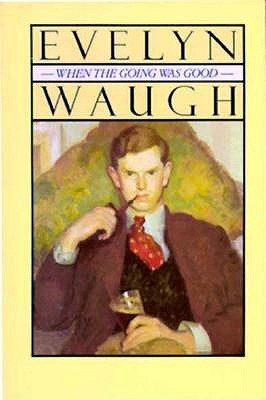What do you think?
Rate this book


298 pages, Paperback
First published January 1, 1946
"Nie sollte der Indienreisende die erstmalige Erschließung des Subkontinents mit einem Aufenthalt in Delhi beginnen. Tut er es dennoch, dann raten wir zur sofortigen Besteigung des Pink City Express, der von der Old Delhi Railway Station schnurstracks nach Jaipur fährt. Im Zug selbst, laut räuspernd die gerade gekaufte "Times of India" aufschlagend, die Penguin-Ausgabe von Evelyn Waughs "When the going was good" neben sich legend, sich frisch gebrühten Chai aus der türkisfarbenen, bahneigenen Plastikthermoskanne eingießend und den Individualventilator über dem Scheitel anschaltend, beruhigt noch im Moment der Abfahrt aus Delhi das monotone Rattern der schlecht vernieteten Schienen den Kopf."Zu unser aller Leidwesen lassen es die Umstände der Pandemie derzeit kaum möglich erscheinen, sich einfach in ein Flugzeug in Richtung Indien oder anderswohin zu setzen, ohne einem strikten Quarantäne- bzw. Testregime unterworfen zu werden. Also heißt es für den geneigten Leser statt im noblen Bissau Palace Hotel in Jaipur, im heimischen Sessel Platz nehmen. Was vielleicht gar keine schlechte Alternative ist, wenn man die Unannehmlichkeiten bedenkt, die das Reisen im Allgemeinen für den wagemutigen Globetrotter potenziell bereithält: Strapaziöse Fahrten über holprige Straßen, eingepfercht zwischen engen Sitzreihen; fiese Tropenkrankheiten und giftiges Getier; gewöhnungsbedürftige kulinarische Spezialitäten; laute Hotelzimmer mit brettharten Betten; überteuerte Souvenirs, die sich keinesfalls harmonisch in die heimische Wohnlandschaft einfügen lassen oder Taxifahrer, die einen zwar nicht ans gewünschte Ziel, aber mit Sicherheit in irgendein zweifelhaftes Etablissement bringen. Deshalb lieber gleich zu Hause bleiben und Evelyn Waughs stilvolle Reiseberichte lesen. Am Ende hat man gelernt, wie man in den unmöglichsten Situationen gentlemanlike Haltung bewahrt und dazu noch eine Menge Geld gespart. (Wobei Letzteres für den echten Snob kaum von Belang sein dürfte. Geld ist schließlich zum Ausgeben da. Wozu sonst?)
"Never should the traveller to India begin the first exploration of the subcontinent with a stay in Delhi. If he does, however, we advise him to immediately board the Pink City Express, which runs straight from the Old Delhi Railway Station to Jaipur. On the train itself, loudly clearing the throat, opening the just bought "Times of India", placing the Penguin edition of Evelyn Waugh's "When the going was good" next to it, pouring freshly brewed chai from the turquoise, railway-owned plastic thermos flask and switching on the individual fan above the top of the head, the monotonous rattling of the badly riveted rails calms the head even at the moment of departure from Delhi".Much to the regret of all of us, the circumstances of the pandemic make it seem almost impossible at present to simply board an aircraft bound for India or elsewhere without being subjected to a strict quarantine or testing regime. So for the inclined reader, instead of sitting in the noble Bissau Palace Hotel in Jaipur, it is time to take a seat in the armchair at home. Which is perhaps not a bad alternative, considering the inconvenience that travel in general can potentially cause the daring globetrotter: Tiring journeys over bumpy roads, crammed between narrow rows of seats; nasty tropical diseases and poisonous creatures; culinary specialities that take some getting used to; noisy hotel rooms with rock-hard beds; overpriced souvenirs that don't blend in at all harmoniously with the domestic living environment; or taxi drivers who take you to some dubious establishment, although not to the desired destination. Therefore it is better to stay at home and read Evelyn Waugh's stylish travelogues. In the end, you have learned how to keep a gentlemanly attitude in the most impossible situations and save a lot of money on top of that. (Although the latter is hardly likely to be relevant for the real snob. After all, money is there to be spent. What else for?)
"What does "clean" mean?"This bit of reporting is typical of Waugh. He doesn't point out a moral for the benefit of his readers. He reports what he saw, and lets us draw our own conclusions. Or, more accurately, he lets us think we're drawing our own conclusions.
"Clin min?"
"You said just now a scout is clean in thought, word, and deed."
"Yis, scoot iss clin."
"Well, what do you mean by that?"
"I min tought worden deed."
"Yes, well, what do you mean by clean."
Both parties in this dialogue seemed to be losing confidence in the other's intelligence.
"I min the tenth scoot law."
...
"All right, Abdul. That'll do."
"Pass, sahib?"
"Yes, yes."
An enormous smile broke across his small face ....
"Of course, it isn't quite like dealing with English boys," said the scoutmaster again.
The Haushabi Sultan was an important young man, finely dressed, and very far from sane. He sat in a corner giggling with embarrassment, and furtively popping little twigs of khat into his mouth.After Aden, Waugh eventually shipped out to Zanzibar, whose heat he found intolerable and to which he gave short shift. He sailed on to Kenya, where he took the train from Mombasa, on the coast, inland to the higher and much more salubrious climate of Nairobi. He seems to have enjoyed colonial life in Kenya -- often seen at the time as a Little England in the tropics.